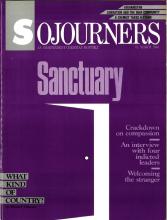The small Honduran village of Los Hernandez was quiet in the pre-dawn hours of March 18,1981. Only a few residents were awake and moving about their homes. It was an uncomfortable quiet, because during the previous three days, the rumble of distant war could be heard from beyond the mountain ridge in the direction of El Salvador.
Into that early morning quiet, a few dozen strangers arrived at one of the homes. They seemed hesitant to come right up to the house. They looked very tattered and dazed.
Beggars are a common sight in Honduras. But so many together was unusual. A Honduran man left his porch to see what the people wanted. As he rounded the bend at the stone fence marking the edge of his property, he stopped short. There were more than a hundred people slowly coming up the dusty path.
By nightfall that same day, more than 3,000 refugees fleeing the war in El Salvador crowded into the yards, paths, and porches of Los Hernandez. The 50 homes in the village were filled with sick children and old folks. A few residents had closed their doors for fear of involvement in something they did not understand.
Honduran soldiers surrounded the village just as the sun set. They refused to let anyone leave the village. For subsequent months Los Hernandez was kept under close military surveillance.
REFUGEE EXPERIENCES such as this are not a new phenomenon in Latin America's history. Since the beginnings of colonization by Spain, Britain, Portugal, and later the United States, countless events have provoked or forced societal upheavals. Although our history books have not explicitly described the affected people as refugees, particularly if they were Indians, they have been just that—refugees from natural disasters, conquerors, dictators, hunger, exploitation, and, in general, from the sudden unraveling of their societal structures.
Read the Full Article

